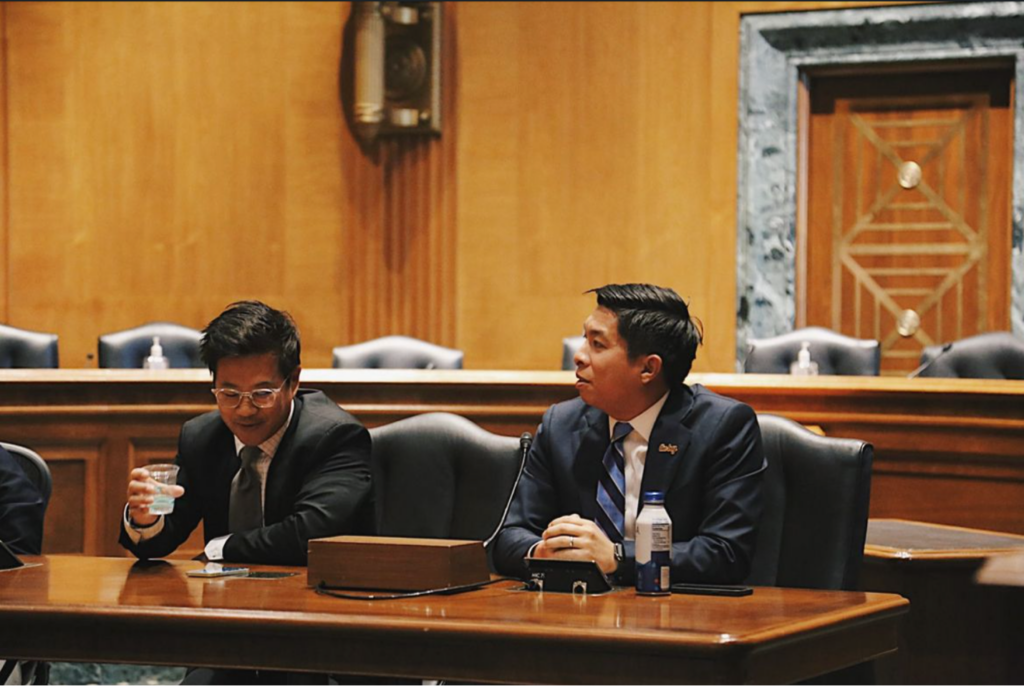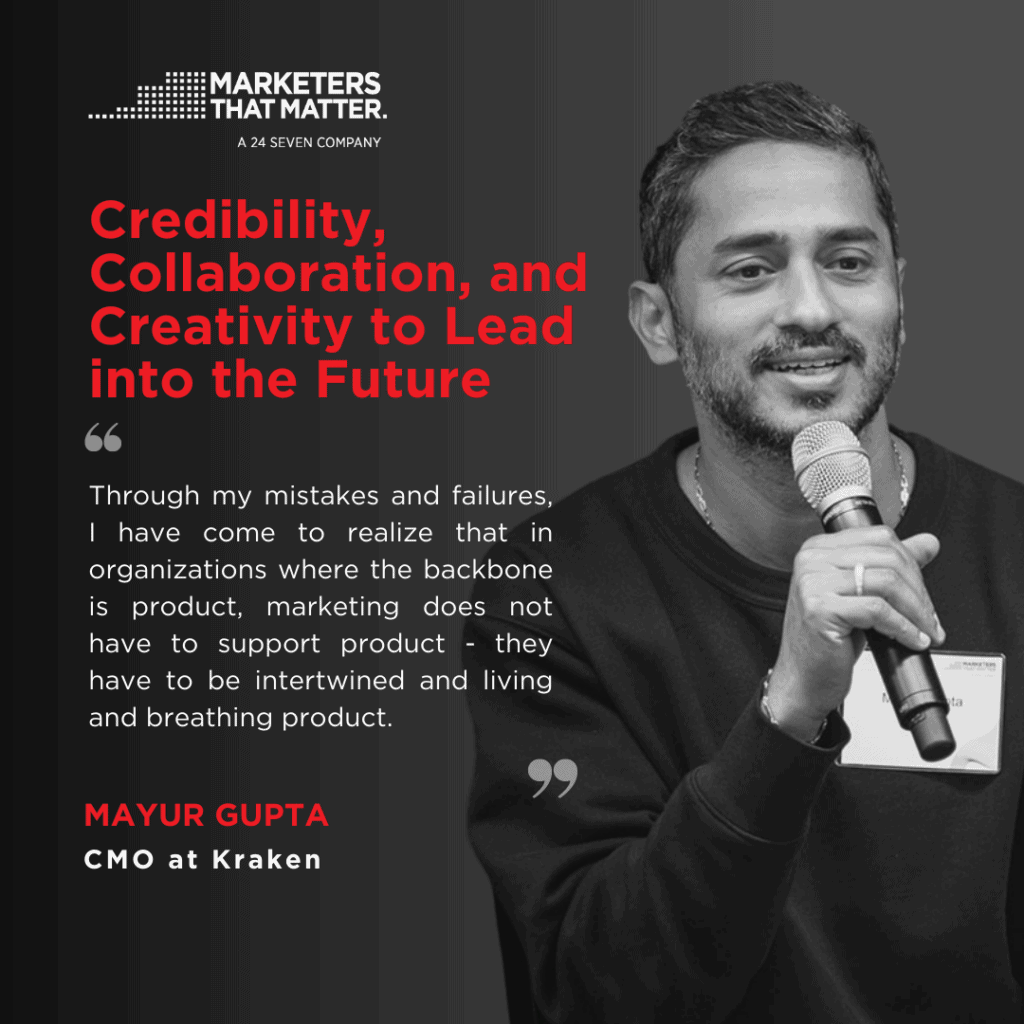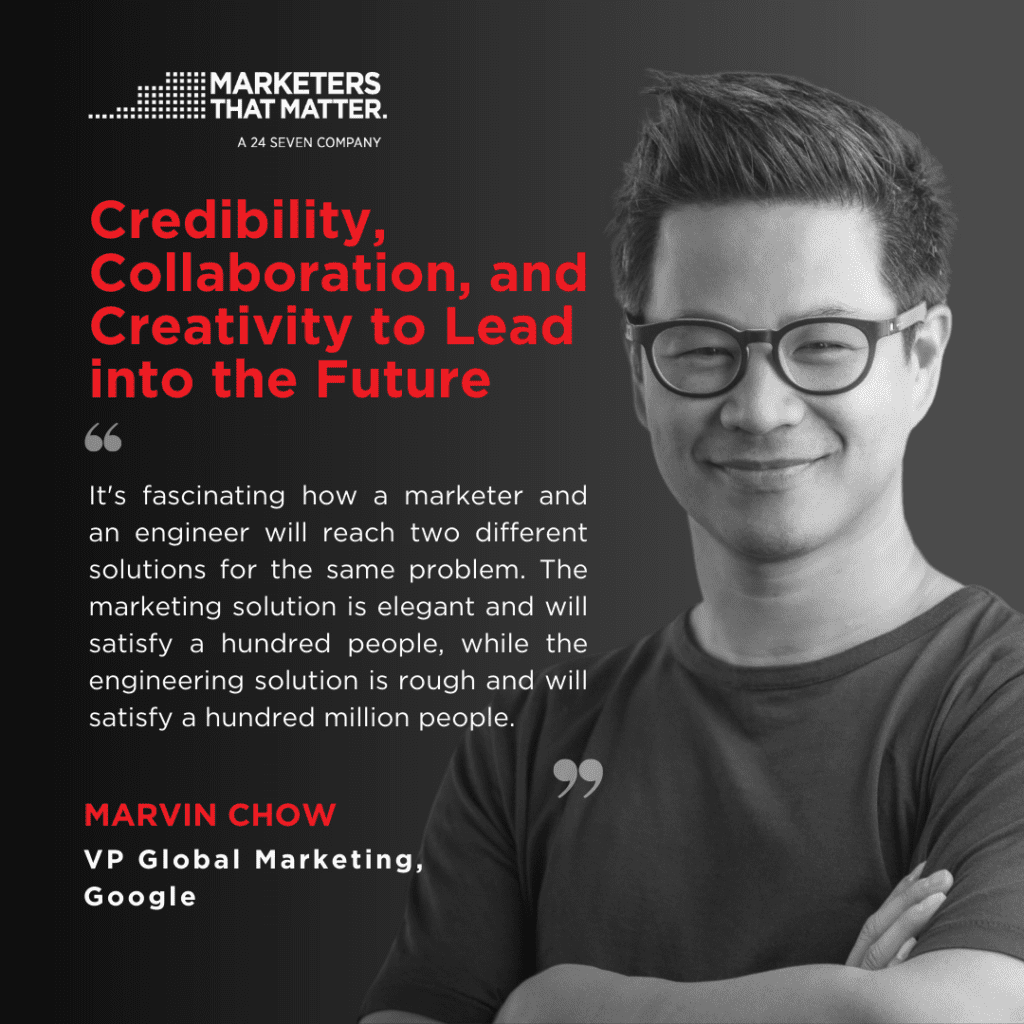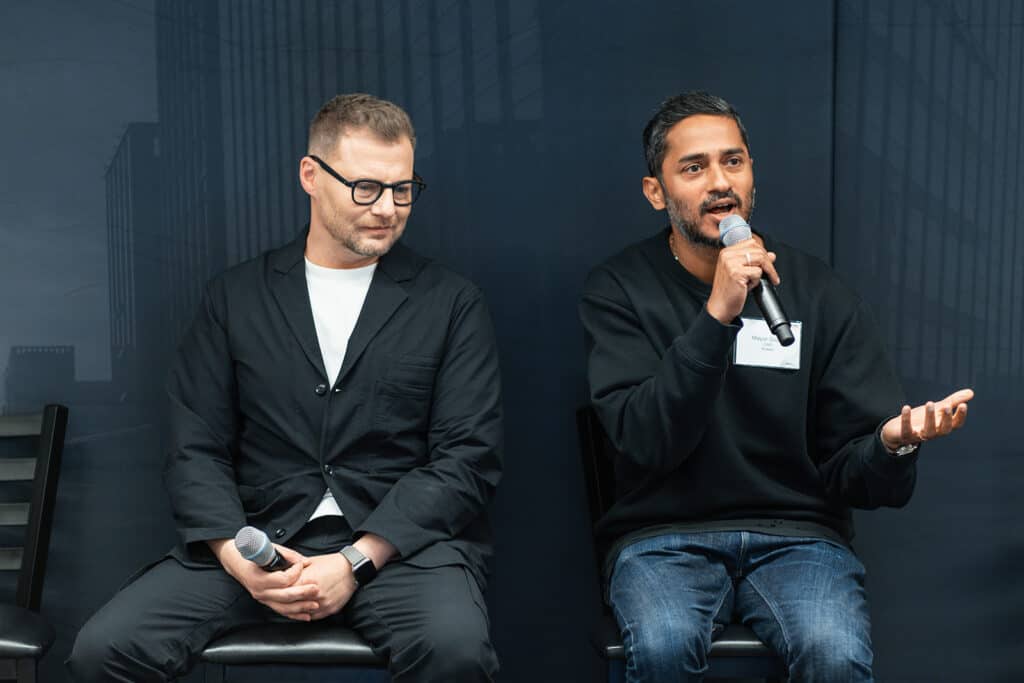What elements transform a startup into an established brand? According to Marvin Chow, VP of Global Marketing at Google, and Mayur Gupta, CMO at Kraken, it’s about credibility, collaboration, and creativity. Marketers who demonstrate these values have the framework for turnkey success. But integral leaders like Marvin and Mayur, who have experienced their share of startup success stories, take pride that their knowledge and company missions have the potential to bring freedom, equity, and accessibility to all.
In their discussion on MTM Visionaries, they talk about their journey of revolutionary innovation, how they have masterfully blended the worlds of product, engineering, and marketing, and the exciting challenge of digging out user needs behind cutting-edge technology.
Here is what they had to say on Visionaries and how it could impact your teams, talent, and future.
You Can Find the MTM Visionaries Podcast On Apple, Spotify, Amazon, and more!
Overview:
- Marketing Journey
- From Startups to Established Brands
- Archetypes of Successful Leaders
- Intertwining Engineering, Product, and Marketing Teams
- Digging Out User Needs
- Leaders Keeping Teams United Despite Change
Marketing Journey
Share a little bit about your marketing journeys and what you’re doing today within your respective organizations
Mayur Gupta: I grew up in India as an engineer and majored in computer science. At one point in my career, one of my mentors asked me to consider being a product manager for an AdTech product. I went from pure engineering to building products for marketing and advertising and eventually got into growth marketing at Spotify.
Over the last 12 years, I’ve worked with incredible people and have learned about the irrationality and serendipity of marketing and how to build human connections. I couldn’t be prouder to be the Chief Marketing Officer at Kraken, one of the world’s largest crypto exchanges, and to work on a mission that revolutionizes how we live and brings financial and economic freedom and equity around the world.
Marvin Chow: I went to school in Boston, majored in information systems, and graduated at the dawn of the commercial internet. I wanted to go into traditional marketing, but found the internet interesting, and ended up going down a long path of marketing for startups founded by Michael Jordan and Benchmark, my own startup, and Nickelodeon, where I launched the first non-English speaking television show, Dora the Explorer. Over the last 25 years, I have primarily worked for Nike and Google, where I currently run marketing for Search, our flagship product, and work on social impact issues like sustainability and crisis response.
To hear more about Marvin Chow, one of MTM’s valued members, see his MTM Member Spotlight here.
From Startups to Established Brands
How do you think about lessons you learned from both sides and what has carried through with you regardless of where you work?
Marvin Chow: The first half of my career was about the velocity of learning. I was willing to work for any person, industry, or company as long as I was outpacing the learning curve of anyone around me. There was a point when I got a call for a huge job offer with Big Tobacco. I had to ask myself, do I really want to make all this money slinging cigarettes to kids?
At that point, I realized how I apply my knowledge means something to people; knowledge is a skill; it’s an asset. My mantra for the last 20 years has been “Mission and Managers.” Is the company I work for doing something good in the world? Is the manager someone who I’m going to learn from and who is invested in me?
That’s been the consistent thread that continues to guide me today – no matter the company’s size or sector. Working at a place like Google –where those two things can come true, and where you can positively impact people – is something I do not take for granted.

Mayur Gupta: It’s been fascinating to work both in Fortune 100s and a few startups that have scaled and become iconic brands. Startups can learn a lot from bigger organizations’ commitment to mission and purpose. From a marketing standpoint, one of the things startups should adopt much earlier is the belief in the power of a resilient, purpose-driven brand.
On the flip side, Fortune 100 brands can learn to adopt the velocity of decision-making and form an operating rhythm where they’re killing functional silos and bringing the entire organization together. They can learn to obsess over outcomes, impact, and customer value.
Archetypes of Successful Leaders
Mission aside, do you think that charisma drives followership and success?
Mayur Gupta: Several different archetypes drive success. There is the charismatic archetype of the WeWorks and Ubers. Then there’s another archetype where the mission comes above all. The third archetype is where the numbers govern everything. Those are the startups you will not hear about because they will get to 1.5 billion in revenue, but they are not the ones who will crack the 10, 20, or 30 billion, and they’re not the ones who will create categories.
Intertwining Engineering, Product, and Marketing Teams
How do you think about your relationships between product and marketing teams?
Mayur Gupta: Through my mistakes and failures, I have come to realize that in organizations where the backbone is product, marketing does not have to support product – they have to be intertwined and living and breathing product.

You don’t start building a brand until you have totally absorbed yourself with the core product and championed it, just like a product manager. Every marketer in that organization has to be a product marketer, absorb all the complexity of the product ecosystem, and tell the stories in a way that makes sense to the person walking down the street.
Marvin Chow: Core product marketing is what we do the most; it’s the invisible work that makes everything go – and the opportunity for marketing to get involved in product development at Google is quite unique and interesting. Generally speaking, marketers are used to hiring an agency and telling them to build this thing, make it blue, say this on the left, and make it square. In contrast, most engineers think about problems first, not solutions. Working with Google engineers, who are world-class AI scientists, you must start with the user problem, not the solution.
I always find it fascinating how a marketer and an engineer will reach two completely different solutions for the same problem. Most of the time, the marketing solution is elegant and will satisfy a hundred people, while the engineering solution is very rough and will satisfy a hundred million people.

Tech and marketing companies need to align on where they want to be, who they want to reach, and what they want to accomplish, and then lay out the objective and the problem to get there. This is how the Real Tone feature was innovated for the Google Pixel 6 phone, and why it’s such an amazing product that solves a real user problem.
Digging Out User Needs
How do you approach the role of marketing when education on utility and value is still extremely variable in the market?
Marvin Chow: The education gap is one of the hardest things about working at a tech company like Google. We focus on advancing technology independent of a known need. We’re working on large language models and are still determining what the application will be in the future. One of our greatest challenges is telling people that we’re solving a problem for them that they don’t know they have.
One of the ways we think about this as it relates to Google Search is to know the user, know the magic, and then connect the two. There is a user need; we must dig that out.
We’ve been focusing a lot on computer vision, like Lens Search. Seeking knowledge can come in many forms; it’s not limited to typing a question into a box. Now we’re trying to tell people they can point their camera at something and say, what is this? Or how can I buy this? Or how do I fix this?
The challenge is, how do we educate them about the problems we solve through both the product and our marketing? How do we create the need before we show them the solution?
Mayur Gupta: Innovative technologies, brands, and businesses fulfill customer needs that customers don’t even know exist. But the challenge in blockchain crypto right now is that we are still focused on how the technology works.
The value of the technology to the end-user is not obvious or immediate like other products such as iOs or Uber. However, it will get there as more application of that underlying ecosystem starts to solve the human use case. Not only this, but it will solve the struggle we all have but don’t think about because we are so ingrained in the traditional systems.
So how do we run a system that has no bias, is ubiquitous, and has equity, regardless of where you are and who you are? We are at a point where marketing’s job in crypto has to bring learning and understanding of the value underneath the substance, not just on the surface.

Leaders Keeping Teams United Despite Change
How have you helped your marketing teams through constant change and unknown, especially in a hybrid work environment? How do you keep your teams feeling connected and part of a culture of innovation?
Marvin Chow: There is a rational and emotional response a leader must operate with in navigating their teams through the unknown; sometimes, we anchor one way or the other. The rational response is securing the business and the strategy, and the emotional is knowing what inspires you to get up every day. As a leader, you have to figure out if you are serving both sides of the spectrum because people are motivated by different things.
Coming back to the office is a big part of that. There’s so much value to being in the office, particularly for young people. The old way of human connections can take us far in weathering this storm.
Mayur Gupta: We are a remote-first organization with 2000+ people. At Kraken, being in a revolutionary category has its own set of challenges, but there has been a beautiful outcome to having a team united on the mission. We bring people on by focusing on whether or not we share the same values.
We know there will be ups and downs, but when you have a team committed to the broader mission, you’ll weather the challenges better. We strive to create an environment where people feel safe to fail, learn from mistakes and challenge themselves to move fast. The most important thing to keep in mind is that every leader needs constant empathy for so much that people are going through.
____________________________________
Visionaries, hosted by Nadine Dietz, airs every week and is brought to you in partnership with The Wall Street Journal. Each week, two new visionaries share their game plan and how that impacts today’s teams, talent, and hybrid work environment.
Marvin Chow, VP Global Marketing at Google: Marvin Chow is Vice President of Global Marketing for Google’s flagship products like Search, Maps, Shopping, and the Google Assistant, in addition to leading the company’s marketing efforts related to sustainability, crisis response, and other key initiatives. Before Google, Marvin worked at Nike, leading global projects like NIKEid and NIKE+, and he’s been an active investor and advisor to several start-ups. Marvin was honored as an Adweek Brand Genius in 2019, named to both Adweek 50 and Gold House’s 100 Most Impactful Asians list in 2021, and honored as an AdColor Catalyst and on Ascend’s A-100 list in 2022.
Mayur Gupta, CMO at Kraken: Mayur joins Kraken from Gannett, part of the USA Today Network, where he led a team of strategists, brand marketers and data scientists to drive the company’s transformation from a news media platform to a digital content subscription marketplace. Prior to that, Mayur held key marketing leadership roles at Freshly, Spotify, Healthgrades, Kimberly Clark and SapientNitro. At Spotify, he drove the vision and strategy to establish a connected marketing ecosystem for Spotify’s 2-sided marketplace that connects artists with users through programmatic discovery and accessibility. Mayur was also the first ever Global Chief Marketing Technologist at Kimberly Clark, one of the largest global consumer packaged goods companies. Throughout his career, Mayur has been recognized for his achievements within the marketing ecosystem by Forbes, Harvard Business Review (HBR), The Economist and more. Mayur currently sits on the MMA Board of Directors, a marketing trade association that brings together the full ecosystem of marketers, martech and media companies working collaboratively to architect the future of marketing.
Marketers That Matter® is a community of top marketing executives coming together to pioneer the future of marketing, sharing real-time experiences, and solving current challenges.
Our parent company, 24 Seven, specializes in helping you find exceptional marketing and creative talent for your teams.


